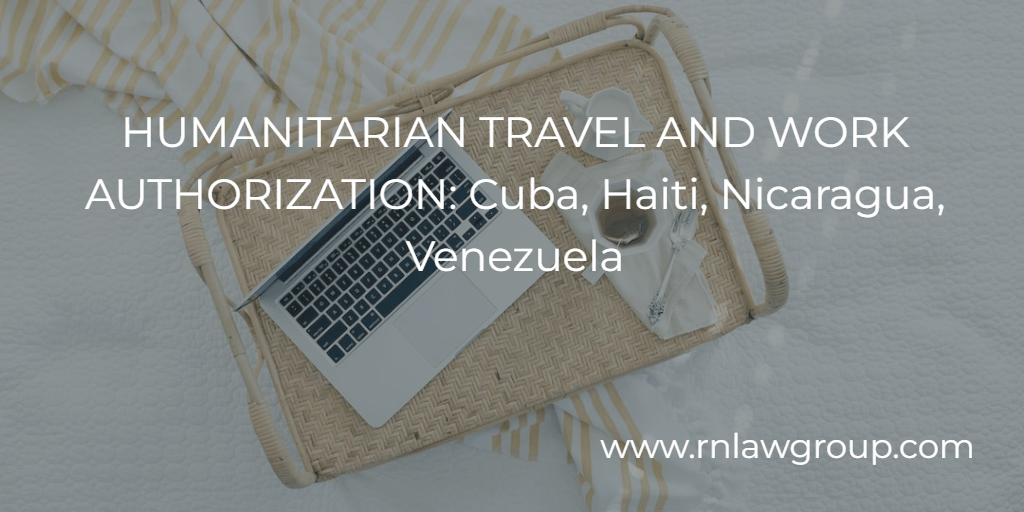
HUMANITARIAN TRAVEL AND WORK AUTHORIZATION: Cuba, Haiti, Nicaragua, Venezuela
The Department of Homeland Security (DHS) has announced processes through which individuals and entities may pledge willingness and ability to receive, maintain, and provide support for nationals of Cuba, Haiti, Nicaragua, and Venezuela (and their immediate family members) to lawfully enter and reside in the United States for a period of up to two years under what is known as “Advance Parole” or “Advance Travel Authorization”. Upon entry, those foreign nationals may apply for work authorization and obtain a Social Security number. Entry into the United States under this humanitarian parole program does not provide a path to any sort of non-immigrant visa, green card (immigrant visa), or citizenship.
To be considered for Advanced Parole, a national of Cuba, Haiti, Nicaragua, and Venezuela (and their immediate family members) must be:
- Be outside the United States;
- Be a national of, or be an immediate family member (spouse, common-law partner, and/or unmarried child under the age of 21) an eligible Cuban, Haitian, Nicaraguan, or Venezuelan;
- Have a U.S.-based supporter who filed a Form I-134A on their behalf that USCIS has vetted and confirmed;
- Possess an unexpired passport valid for international travel;
- Provide for their own commercial travel to an air U.S. POE and final U.S. destination;
- Undergo and pass required national security and public safety vetting;
- Comply with all additional requirements, including vaccination requirements and other public health guidelines; and
- Demonstrate that a grant of parole is warranted based on significant public benefit or urgent humanitarian reasons, and that a favorable exercise of discretion is otherwise merited.
It should be noted that an individual is ineligible to be considered under this program if that individual is a dual national, permanent resident of, or possesses refugee status in another country, unless the Department of Homeland Security operates a similar parole process for that country’s nationals. This requirement does not apply to immediate family members (spouse, common-law partner, or unmarried child under the age of 21) of an eligible national of Cuba, Haiti, Nicaragua, or Venezuela with whom they are traveling.
Individuals from Cuba, Haiti, Nicaragua, and Venezuela cannot self-petition; instead, it is incumbent upon individuals seeking Humanitarian Parole into the United States to have a U.S.-based supporter/sponsor who will file a Form I-134A on their behalf. Supporters must file a separate Form I-134A for each beneficiary, even minor children. Supporters can be individuals filing independently, filing with other individuals, or filing on behalf of organizations, businesses, or other entities. There is no fee required to file Form I-134A and should be filed online here. To serve as a supporter, an individual or individual representing an entity must:
- Be a U.S. citizen, national, or lawful permanent resident; hold a lawful status in the United States such as Temporary Protected Status or asylum; or be a parolee or recipient of deferred action or Deferred Enforced Departure;
- Pass security and background vetting, including for public safety, national security, human trafficking, and exploitation concerns; and
- Demonstrate sufficient financial resources to receive, maintain, and support the individual(s) they are agreeing to support for the duration of their parole period.
Supporters who file Form I-134A on behalf of a national from Cuba, Haiti, Nicaragua, or Venezuela be willing and able to receive, maintain, and support the beneficiary listed in Form I-134A for the duration of their parole. Examples of the types of support for beneficiaries that supporters should keep in mind when considering their ability to meet this commitment include receiving the beneficiary upon arrival in the United States and transporting them to initial housing; ensuring that the beneficiary has safe and appropriate housing for the duration of their parole and initial basic necessities; helping the beneficiary complete necessary paperwork such as for employment authorization, for a Social Security card, and for services for which they may be eligible; ensuring that the beneficiary’s health care and medical needs are met for the duration of the parole; and assisting the beneficiary with accessing education, learning English, securing employment, and enrolling children in school.
Supporters may not file a Form I-134A on behalf of an unnamed beneficiary—the name of the sponsored national must be included on Form I-134A along with other relevant biographical information. A supporter may agree to support more than one beneficiary, such as for different members of a family group, but must file a separate Form I-134A for each beneficiary.
The Form I-134A sponsor/supporter will submit the petition online for review with United States Citizenship and Immigration Services (USCIS). If the filing is sufficient i.e. approved, the sponsored national of Cuba, Haiti, Nicaragua, or Venezuela (“Beneficiary”) will receive an email from USCIS with instructions on how to set up a USCIS online account and other next steps. The beneficiary must confirm their biographic information on myUSCIS and attest to completion of all requirements, including attesting to certain diplomatic, familial, and medical/vaccination requirements as well as submit to a medical screening for tuberculosis, including an Interferon-Gamma Release Assay (IGRA) test, within 90 days of arrival.
Once the beneficiary has confirmed their biographic information and attested to completing all other requirements, USCIS will conduct their final reviews. If approved, Beneficiaries will receive an email instructing them to check their online account for their authorization to travel. This authorization is valid for 90 days and acts as a boarding foil. If the beneficiary has been authorized to travel to the United States, they must arrange and fund their own travel. Beneficiaries must arrange to fly to the United States by air directly to an interior port of entry and their final destination. Upon entry, the foreign national should receive an I-94 notifying the length of their lawful period of stay in the United States.
For information on the Humanitarian Parole program for nationals of Cuba, Haiti, Nicaragua, or Venezuela, or for information about resources available to our brothers and sisters seeking shelter here in the United States, please contact Ryan Wilck at ryan@rnlawgroup.com
By : Ryan A. Wilck, Partner and Attorney at Law
Ryan Wilck is an attorney at Reddy Neumann Brown PC assisting helping clients and their employees through the phases of the Green Card process. “Concilio et labore” is not only the motto of Ryan’s favorite sports club but is also his life’s motto; all things come through wisdom and effort. Ryan is passionate about gaining the trust of his clients utilizing a relentless and detail-oriented work ethic to understand their specific goals and concerns, hoping to instill a sense of confidence and stability. Whatever your immigration problem, he and his team will find a solution, through wisdom and effort. Reddy & Neumann has been serving the business community for over 20 years and is Houston’s largest immigration law firm focused solely on employment-based business immigration. We work with employers and their employees, helping navigate the complex immigration process efficiently and cost-effective.

